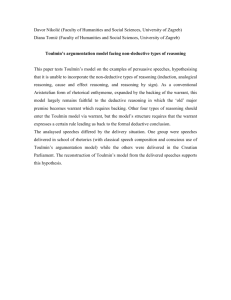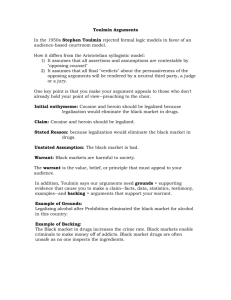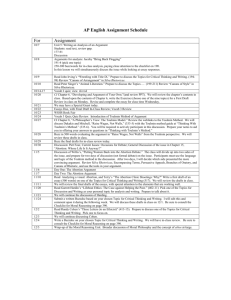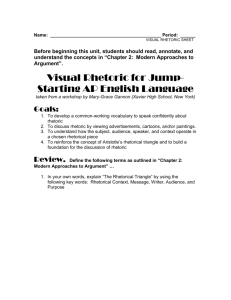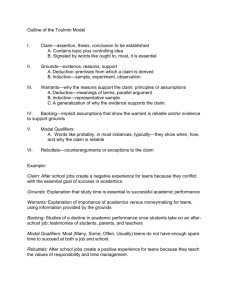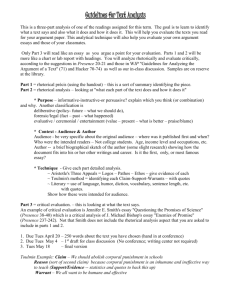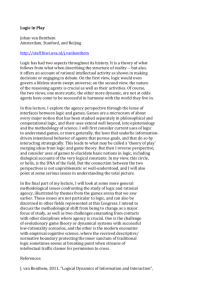A response to van Benthem - COGENCY | Journal of Reasoning and
advertisement
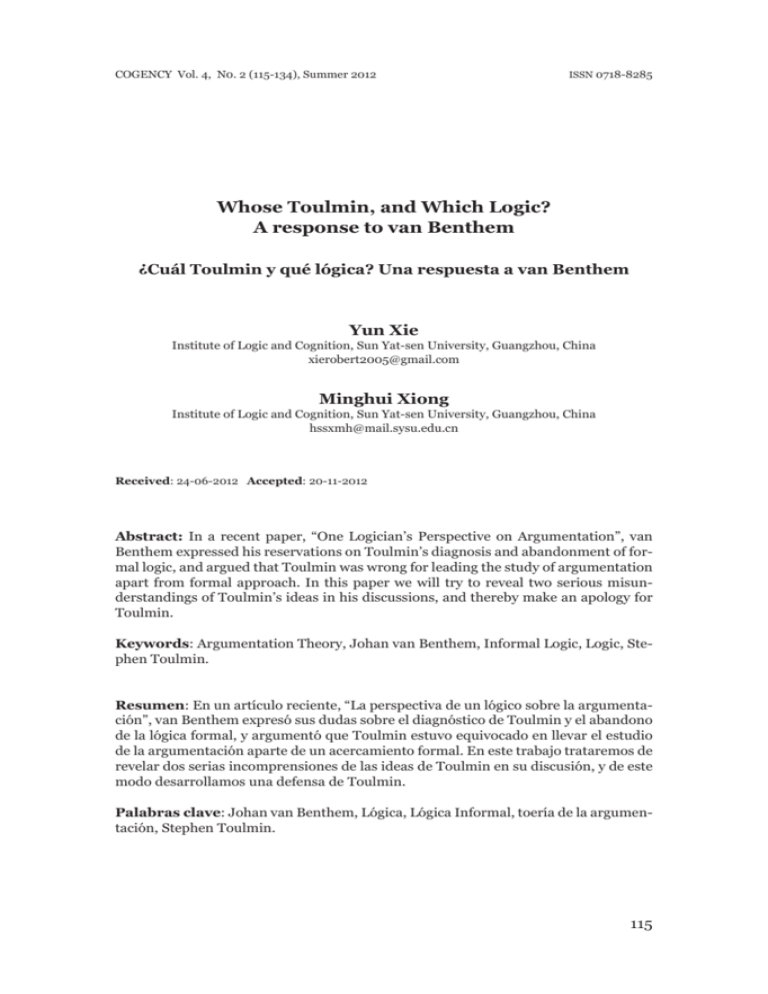
COGENCY Vol. 4, N0. 2 (115-134), Summer 2012 ISSN 0718-8285 Whose Toulmin, and Which Logic? A response to van Benthem ¿Cuál Toulmin y qué lógica? Una respuesta a van Benthem Yun Xie Institute of Logic and Cognition, Sun Yat-sen University, Guangzhou, China xierobert2005@gmail.com Minghui Xiong Institute of Logic and Cognition, Sun Yat-sen University, Guangzhou, China hssxmh@mail.sysu.edu.cn Received: 24-06-2012 Accepted: 20-11-2012 Abstract: In a recent paper, “One Logician’s Perspective on Argumentation”, van Benthem expressed his reservations on Toulmin’s diagnosis and abandonment of formal logic, and argued that Toulmin was wrong for leading the study of argumentation apart from formal approach. In this paper we will try to reveal two serious misunderstandings of Toulmin’s ideas in his discussions, and thereby make an apology for Toulmin. Keywords: Argumentation Theory, Johan van Benthem, Informal Logic, Logic, Stephen Toulmin. Resumen: En un artículo reciente, “La perspectiva de un lógico sobre la argumentación”, van Benthem expresó sus dudas sobre el diagnóstico de Toulmin y el abandono de la lógica formal, y argumentó que Toulmin estuvo equivocado en llevar el estudio de la argumentación aparte de un acercamiento formal. En este trabajo trataremos de revelar dos serias incomprensiones de las ideas de Toulmin en su discusión, y de este modo desarrollamos una defensa de Toulmin. Palabras clave: Johan van Benthem, Lógica, Lógica Informal, toería de la argumentación, Stephen Toulmin. 115 COGENCY Vol. 4, N0. 2, Summer 2012 1. Introduction It is still easy today to recall that, historically, when Toulmin first put forward his theory of argument (1958), his book was either poorly brushed aside, or fiercely criticized as a hostile “anti-logic book”, by logicians who endorsed the view of modern formal logic. Ever since that unfortunate encounter, for the following fifty years, modern logic has continued to achieve its own glorious accomplishments, unaffected by any of what Toulmin has said. Toulmin’s theory of argument, in parallel, has also been well taken and appreciated by scholars who study ordinary argumentation and communication. The hasty divorce not only exiles Toulmin’s idea outside logic and philosophy, but also decreases the successive efforts from modern logicians to investigate how much truth there is in Toulmin’s accusations. However, nowadays many logicians may think that it could be a better occasion to pick up Toulmin’s charges again, and to scrutinize his ideas in light of a semi-century’s outstanding new developments of modern logic. In a recent paper (2009), Johan van Benthem, currently one of the most prestigious formal logicians in the world, makes this interesting and rare occasion possible, for us to see how Toulmin’s ideas could be seriously taken up again by formal logicians of the present age. In that paper, van Benthem offers for us many insightful commentaries on Toulmin’s theory of argument “in the light of modern developments in logic”, as well as some serious reservations on Toulmin’s diagnosis and abandonment of formal logic. In particular, he argues that mathematical formalism is still the powerful methodology in logic, and that Toulmin is wrong for leading the study of argumentation away from the formal logical approach. This paper is a response to van Benthem’s discussion on Toulmin. We think that he has misinterpreted, in a quite important way, Toulmin’s accusations against formal logic, and his defence thereby seems to be misleading, and his arguments against Toulmin not so persuasive. In sections 2 and 3 of what follows, we first examine van Benthem’s reading of and his critiques of Toulmin. In sections 4 and 5, two responses are made by revealing, respectively, two main misunderstandings of Toulmin’s ideas in van Benthem’s discussions. In section 6, we provide a different reading of the historical developments of logic, which will help us on a just re-evaluation of Toulmin’s ideas. Taken together, we hope they can make an apology 116 Whose Toulmin, and Which Logic? A response to van Benthem / Y. Xie and M. Xiong for Toulmin and his rejection of mathematical formalism. In the last section, we offer some concluding remarks. 2. Van Benthem on Toulmin: An Overview Van Benthem begins his paper with an appreciation of the richness of the Toulmin model of argument (which he terms the Toulmin Scheme). He agrees that “Toulmin’s scheme for the structure of argument is more natural and evident”, and that it captures “many aspects of ordinary reasoning”, when compared with the traditional simple binary scheme of inference, i.e. the bare transition from premise to conclusion (van Benthem 2009, pp. 15-16). However, van Benthem continues, if seen from the perspective of current developments of modern logical theories, the idea that arguments should be understood in a rich way to get its “broader maps” is no longer controversial today. Accordingly, the contrast between Toulmin’s views and that of mathematical logic is not as sharp as it was at the time of Toulmin’s book (1958). And this is due to the fact that “things have changed” (van Benthem 2009, p. 16): Toulmin’s ideas that inference comes in different forces, and is task-relative, have already been widely taken and well managed in the development of modern formal logic. Specifically, these changes are fairly manifest in those new branches of logic developed since 1980s, such as semantics of natural language and the studies of commonsense reasoning, as well as the new systems of nonmonotonic logics and belief-revision logics. Grounded on this, van Benthem concludes his first commentary point on Toulmin by claiming that logic, through its practical turn, “has absorbed similar ideas to Toulmin’s, largely through meetings with computer science and artificial intelligence” (van Benthem 2009, p. 17). Moreover, Toulmin’s view that “standards of inference are task-relative, and logic with its universal claims must be rejected” is not only no longer as threatening as before, but it has also been disproved by the historical fact that “but the opposite has happened” (van Benthem 2009, p. 17). That is, the discipline of logic has indeed “been enriched” and been given a “much greater scope”, it is obviously not as unviable or unpromising as it was alleged to be by Toulmin. Besides, to better support his point, van Benthem has also provided for 117 COGENCY Vol. 4, N0. 2, Summer 2012 us two historical analogies. The first one is Bernard Bolzano, who also “saw the task of logic as charting different natural styles of reasoning in different settings”, and “predates Toulmin in not placing the central emphasis on logical forms” (van Benthem 2009, p. 17). The second one is the HempelOppenheim scheme of explanation, which “predates the Toulmin schema by a decade” and shows that “philosophers of science had long noted that standard logical consequence will not do for the variety of reasoning found in science” (van Benthem 2009, p. 18). However, these two “parallel observations on a practice that clearly goes beyond standard logic” reveal otherwise a spirit which is just opposite to that of Toulmin. That is, as it happened in both cases, “logical form has not been dismissed altogether”, and “logic is not abandoned, but enriched” (van Benthem 2009, pp. 1718, italics original). Therefore, van Benthem raises his main criticism that “Toulmin’s decision to break away [from logic] was fateful, and I wonder how justified it really was” (van Benthem 2009, p. 19). The second part of van Benthem’s discussion of Toulmin concerns the opposition of ‘logical/mathematical form’ and ‘procedural/juridical formalities’. According to van Benthem, by highlighting “the procedure by which we draw inference and the importance of procedure in argumentation generally”, Toulmin is “right on the mark” and “does point at a major theme that has been neglected in modern logic” (van Benthem 2009, p.19). In a nutshell, “reasoning is an activity”, and it is performed “interactively with others”, thus logic should study not only some products of such acts, but also “those acts themselves” (van Benthem 2009, p. 19, italics original). However, once again, in the light of modern development of logic, these ideas have already been long pursued and properly realized by “current systems of dynamic epistemic logic”, which “incorporate [into modern logic] a wide variety of dynamic viewpoints, without giving up its classical methodological standards” (van Benthem 2009, p. 19). But on the contrary, as van Benthem has criticized, Toulmin seems to have overemphasized the opposition between ‘form’ and ‘formalities’, thereby hastily judging that the mathematical methodology is incapable of offering effective tools in dealing with those procedural concerns. Whereas, van Benthem argues, Toulmin’s position is untenable, since virtually “formalities have form, there is no opposition,” and “formalities have procedural structure, and that structure can be studied by bringing out the major operations creat- 118 Whose Toulmin, and Which Logic? A response to van Benthem / Y. Xie and M. Xiong ing it in a mathematical formalism” (van Benthem 2009, p. 21). This could not only be easily confirmed by recent developments of Logical Dynamics, but has indeed also been well exemplified in the 1950s by works on dialogue games of Paul Lorenzen. Consequently, in conclusion, van Benthem claims that “years before Toulmin’s book, logic had already started developing tools for some of the very things he was asking for: formalities, and task dependence” (van Benthem 2009, p. 20). Moreover, he even suggests that we should realize that actually “one should go further than Toulmin’s own scheme - and one very effective tool for doing that is using not less but more logic!” (van Benthem 2009, p. 20, italics original). Here again, his criticism on Toulmin is nicely echoed. The immature disbelief in the power and capacity of mathematical formalism, the unlucky ignorance of the coeval logical ideas and developments at his time, make Toulmin’s judgment on logic feeble, and his decision to “leave the party” not truly justified. The last part of the paper is a discussion about the joint concerns for studies of logic and argumentation theory. Here van Benthem shares with us his optimism, as well as his insightful proposals, for the future interaction between these two fields. He indicates to us that by taking argumentation more adequately, logical systems can be better enriched. In particular, “it seems promising to merge dynamic logics of information flow with concrete models of argumentation” (van Benthem 2009, p. 22). In the end, as his final verdict, van Benthem concludes, Toulmin “was right in many of his major observations, but I would say that he was wrong in his decision to leave the party [of logic]. Working together, argumentation theory and logic can advance along Toulmin’s lines extending both practical coverage and theoretical insight” (van Benthem 2009, p. 22). 3. Van Benthem on Toulmin: A Reconstruction As a whole, by his paper van Benthem offers us a critical scrutiny of Toulmin’s ideas, which is, needless to say, quite thoughtful and subtle. His reading of Toulmin’s work is impressively careful, and his reservations and criticisms elaborate and well-advised. To better capture the gist, here we will try to give an illustrative reconstruction of van Benthem’s reading of Toulmin, and of his corresponding criticisms as well. 119 COGENCY Vol. 4, N0. 2, Summer 2012 In the first place, the line of argument that Toulmin has followed to make his case, as it is refined in van Benthem’s paper, is as follows: Firstly, Toulmin makes the case that (T1) “comparing with what has been delivered in traditional simple binary scheme, ordinary reasoning has more aspects and elements, as revealed by the Toulmin Scheme.” Given this, on the one hand, it leads Toulmin to find that (T2) “inference comes in different forces, and is task-relative”, which directly leads to the claim that (T3) “logic with its universal claims must be rejected”. On the other hand, it also helps him to emphasize (T4) “the importance of procedure in argumentation”, thus to put forward “a procedural view of argument, which replaces mathematical form by juridical formalities”. In the meantime, Toulmin also holds that (T5) there is “an opposition of logical form and procedural formalities,” and he believes that (T6) “logic with a mathematical formalism is incapable of developing effective tools for formalities.” From this he has been led to (T7) “a dismissal of form altogether”. Ultimately, given (T3) and (T7), which have indicated respectively the incompetence of logic in dealing with task dependence and formalities, Toulmin has urged (T8) “the abandonment of logic, which breaks away the connection between logic and argumentation theory”. Accordingly, van Benthem tries to put forward his criticisms into a three-fold strategy. First and foremost, it is obvious that (B1) history, by the development of modern logic, simply proves that “the opposite has happened”, that is, “logic has not been abandoned, but enriched”. It is supported by the fact that (B2) “logic has experienced its practical turn since 1980s, thus has absorbed similar ideas to Toulmin’s through meetings with computer science and artificial intelligence”. This could be further exemplified by (B3) “the development of study of semantics of natural language and commonsense reasoning, as well as the new systems of nonmonotonic logics and belief-revision logics.” Secondly, it could also be argued that (B4) “Toulmin’s abandonment of logic is hasty and not truly justified”, because (B5) “his disbelief in the power and capacity of logic (with mathematical formalism) is ill-founded”, and (B6) “his negative judgment of logic is immature and radical, because of his ignorance of the coeval logical ideas and developments at his time”. (B6) can be simply verified by indicating (B7) “three historical analogies: Bolzano’s ideas of logic, the Hempel-Oppenheim scheme of explanation, and 120 Whose Toulmin, and Which Logic? A response to van Benthem / Y. Xie and M. Xiong dialogue games of Lorenzen”. The first two indicates, quite differently from Toulmin, a due respect for the role of form in logic, and the latter offers the evidence that logic can and indeed has already started, years before Toulmin’s book, to develop tools for dealing with formalities. Meanwhile, (B5) could be well supported when pointing out (B8) “Toulmin’s opposition between form and formalities is illusive”. Because, not only (B9) “formalities have form, i.e. procedural structure, thus can be studied by bringing out the major operations creating it in a mathematical formalism,” but also that (B10) “those procedural formalities embodied in Toulmin’s own scheme can be even better and effectively handled by using more logic”, once you see (B11) “the connection between formalities and logical dynamics”. And thirdly, it has also been hinted that (B12) “the breaking away of logic and argumentation is actually unfortunate and fateful”. Since, first, (B13) “these two fields have joint concerns, thus a lot of works which try to bridge and merge them will be promising”, and second, (B14) “current argumentation theory might need to bring in not less but more logic”. That is because, for example, not only (B10) “Toulmin’s own scheme can be even better handled by using more logic”, but also (B15) “some of current informal paradigms might acquire some more dynamics with a dose of logical insights from the last decades”. And third, (B16) “argumentation theory cannot just stay on its own”, otherwise (B17) “it is not sure where argumentation theory is heading.” To sum up, for one thing, Toulmin’s rejection of logic based on ideas like the variable force of reasoning and task dependence [(T3)] has been easily falsified by the historical developments [(B1)]. For another, his disbelief of logic based on formalities [(T7)] is hasty, and relies indeed on an illusory opposition, thus his abandonment of logic unjustified [(B4)]. Moreover, Toulmin’s decision to break away from logic is proved to be fateful, when considering the promising possibilities, and even the necessity, of the interaction between these two fields [(B12)]. Therefore, taking those three counter-arguments together, it is easy to conclude that (C) “Toulmin was wrong in his decision to leave the party of logic.” Obviously, van Benthem’s criticisms are well-constructed, and appear to be quite compelling. They provide us a particular and insightful way for our understanding and appraisal of Toulmin. However, as we will argue in the following two sections, there also exist some possible flaws in his 121 COGENCY Vol. 4, N0. 2, Summer 2012 arguments, which turn out to be based on some fateful misinterpretations of Toulmin. The first one is concerned with Toulmin’s hasty rejection of mathematical formalism, while the second one is related to Toulmin’s unjustified abandonment of logic. 4. Formality, Formalism and Practical Discontinuity The trouble does not lie within the formal systems themselves: it would be pointless to argue that one could not have formal mathematical calculi concerned with relations between propositions, since everyone knows what elaborate and sophisticated propositional calculi have in fact been built up in recent years. The objections turn rather on the question, what application these calculi can have to the practical assessment of arguments - whether the relations so elegantly formalized in these systems are, in fact, the ones which concern us when we ask in practice about the cogency, force and acceptability of arguments. (Toulmin 1958, pp. 179-80, italics original) As one of his substantial critiques, van Benthem accuses Toulmin of being blind to the power and capacity of mathematical formalism, and thereby proposing a hasty and unjustified abandonment of logic. According to him, Toulmin has misconceived the contrast between form and formalities, and has over-reacted on this illusory opposition to dismiss logical form altogether. Furthermore, he has also wrongly predicted that logic with formalism cannot handle issues like field-dependence, thus misjudging the fate of formal logic. However, as van Benthem has attempted to demonstrate with great efforts, this is not the case at all. When you have figured out that formalities have form, and procedural structure can all be studied by bringing out the major operations creating it in a mathematical formalism, or, when you have a look at the works of dialogue games of Lorenzen, which has already hinted at the effective formal tools in dealing with procedures, or, when you have witnessed the developments of new nonmonotonic and epistemic logics and systems, all of which make it manifest that reasoning forces or field dependence can all be represented within formal logical systems, then you should conclude forthwith that Toulmin is obviously at fault for his insufficient judgment of the power of mathematical formalism. As a result, he is apparently also wrong in his negative view on logic. 122 Whose Toulmin, and Which Logic? A response to van Benthem / Y. Xie and M. Xiong Properly speaking, if Toulmin did reject mathematical formalism, and formal logic as well, just simply based on his judgment that issues like procedure, reasoning forces or field-dependence cannot possibly be handled in a manner of mathematical formalism, then van Benthem is certainly advancing a very strong and persuasive critique, and Toulmin is definitely guilty of this unjustified ignorance of both the power of formalism and the development of logic. However, despite the apparent strength of this argument, if that is not what Toulmin really had in mind, we are probably facing a straw person. There is no doubt that Toulmin did criticize mathematical formalism in his works, and as a result, rejected it in his theory of argument. But his criticisms and his corresponding ideas of logic, in our reading, indeed go in a quite different way. Toulmin starts at the very beginning with the central question of “how we are to set out and analyze arguments in order that our assessments shall be logically candid?”(Toulmin 1958, p. 9). That is, how we are to show the validity or invalidity of an argument clearly, and to make explicit the grounds it relies on and the bearing of the conclusion, thereby to allow us to do justice to all different issues in the establishment of conclusions when subjecting our arguments to rational assessment (Toulmin 1958, p.95). With this task and principle in mind, Toulmin did propose some sort of opposition between mathematical form and jurisprudential formalities, in such a way of treating and comparing them as two available rival models, “one mathematical, the other jurisprudential” (Toulmin 1958, p. 95). Then he took pains to argue that the former is less candid than it was customarily presumed to be. Because, as he has recognized, the “establishment of conclusions” in the normal run of life turns out to be more complex than a simple “logical demonstration”. A number of issues of different sorts will emerge in our analysis and criticism of the former kind, but they either have no room, or have to be distorted, in our customary theories of the latter kind. For one thing, statements used in our ordinary arguments have functional differences, they give birth to subtle distinctions (such as data, warrant, backing, etc.), but most of them have been overlooked or covered up when we try to lay out our arguments in a tidy and simple geometrical form (Toulmin 1958, pp. 97-107). Meanwhile, some categories and distinctions (for example, major premise, deductive/inductive) produced by formal lo- 123 COGENCY Vol. 4, N0. 2, Summer 2012 gicians endorsing the geometrical model are ambiguous, thus turn out to be a misinterpretation of reality (Toulmin 1958, pp. 107-118). Moreover, some functional differences, due to its field-dependence and contextual complexity, “cannot be explained away by formal devices: e.g., by inventing separate formal systems of alethic, deontic, or epistemic logic for every purpose and field” (Toulmin 1976, p. 277). For another, by choosing the geometrical model, formal logicians have also been led to over-value what Toulmin calls “analytical arguments”. Accordingly, they try to sublime it; to make it out to be the only good and ideal type of argument, and to demand that all the other classes of argument should conform to its standards regardless. Consequently, “they have built up their systems of formal logic entirely on this foundation; and they have felt free to apply to arguments in other fields the categories so constructed” (Toulmin 1958, p. 166). However, in reality, analytical argument is far from a representative type, since there exist a lot of substantial arguments “whose cogency cannot be displayed in a purely formal way, even validity is something entirely out of reach and unobtainable” (Toulmin 1958, p. 154). Therefore, Toulmin points out, “the differences between the criteria we employ in different fields can be circumvented in this way only at the price of robbing our logical systems of all serious application to substantial arguments” (Toulmin 1958, p. 167). With all those reasons provided, Toulmin has informed us that “unfortunately an idealized logic, such as the mathematical model leads us to, cannot keep in serious contact with its practical application” (Toulmin 1958, p. 147). As he has observed, there in fact has already grown up a “Great Divide between the formal logician and the practical arguer” (Toulmin 1958, p. 163), viz. “a systematic divergence between two sets of categories: those we find employed in the practical business of argumentation, and the corresponding analyses of them set in books of formal logic” (Toulmin 1958, p. 147). At last, it is due to this practical discontinuity that Toulmin has raised his rejection of mathematical formalism in the study of argument: “so far as formal logicians claim to say anything of relevance to arguments of other than analytic sorts, judgment must therefore be pronounced against them” (Toulmin 1958, p. 147). If our reading of Toulmin is reasonable, it can be seen that he is probably not guilty of hastily dismissing mathematical formalism based on 124 Whose Toulmin, and Which Logic? A response to van Benthem / Y. Xie and M. Xiong some immature disbelief of the power of formalism. By contrasting mathematical form and jurisprudential formalities, he indeed has no intention to argue that procedural issues cannot possibly be handled in a manner of mathematical formalism. Rather, what he is trying to show is that if we do it exactly in that way, we are ending with a logical theory losing it original practical application. Accordingly, the real disbelief underlying Toulmin’s rejection of mathematical formalism has never been concerning with the possible development of formal tools or systems for representing or modeling those procedural aspects of arguments. It is, otherwise, related to the legitimacy and applicability of formalization with respect to actual practice of argument analysis and assessment. Therefore, understood properly, Toulmin’s criticisms of mathematical formalism stem from his suspicion that “can one cast into a timeless mathematical mould the relations upon which the soundness and acceptability of our arguments depend, without distorting them beyond recognition?” (Toulmin 1958, p. 182) And the real forces of his rejection rest indeed upon the fact that “practical critic of arguments, as of morals, is in no position to adopt the mathematician’s Olympian posture…strength, cogency, evidential support and the like…resist idealization as much as our utterances themselves” (Toulmin 1958, p. 183). Moreover, even Toulmin himself has made it quite clear that he is not against formal logical systems themselves which glorify the methodology of mathematical formalism. He clarifies that what he is really advocating is not that “the elaborate mathematical systems which constitute ‘symbolic logic’ must now be thrown away; but only that people with intellectual capital invested in them should retain no illusions about the extent of their relevance to practical arguments” (Toulmin 1958, p. 185). As a matter of fact, his real and exact appeal is that “in order to get a logic which is lifelike and applicable…we shall have to replace mathematically-idealized logical relations…by relations which in practical fact are no more timeless than the statements they relate” (Toulmin 1958, p. 185, italics added). To sum up, the contrast between form and formality, as well as the issues like field-dependence or variability of force of reasoning articulated by Toulmin, were not brought forward intending to reveal the incompetence of formalism. Rather, they have been advanced to unveil the practical discontinuity of formalization with our real lives. Consequently, in defence of mathematical formalism against Toulmin’s accusation by arguing that 125 COGENCY Vol. 4, N0. 2, Summer 2012 there could be no difficulties in treating them successfully in a formalized way, will probably be beside the point. Mathematical formalism is certainly a methodology with great power, as the modern developments of logic have well illustrated. But that is not the issue Toulmin has addressed and decried. 5. Taking Logic Seriously The question still needs to be pressed, whether this branch of mathematics is entitled to the name of ‘logical theory’…this branch of mathematics does not form the theoretical part of logic in anything like the way that the physicist’s mathematical theories form the theoretical part of physics. (Toulmin 1958, p. 186) The real problem of rational assessment - telling sound argument from untrustworthy ones, rather than consistent from inconsistent ones - requires experience, insight and judgment, and mathematical calculations can never be more than one tool among others of use in this task. (Toulmin 1958, p. 188) As another substantial critique, also his final verdict, van Benthem charges Toulmin with the fateful breaking away and unjustified abandonment of logic. As he has argued, not only both fields of argumentation and logic could, and indeed should, interact more with mutual benefits, but also Toulmin’s own scheme could be better dealt with by using more logical tools. Besides, Toulmin should have shown enough respect to logic with mathematical formalism, rather than “turning to the Law as the major paradigm of reasoning” (van Benthem 2009, p. 15), since “historically, logic probably had its origins in dialectical and legal practice, but it was the combination of these origins with mathematical methodology that produced its great strength and staying power” (van Benthem 2009, pp. 20-21, italics original). Furthermore, as was nicely proved by recent developments of logic in modern times, logic has been prosperously enriched in this mathematically formal approach. However, as we read his works, Toulmin has nowhere urged such a breaking away or abandonment of logic per se, notwithstanding his serious resistance against mathematical formalism in the study of argument. Quite 126 Whose Toulmin, and Which Logic? A response to van Benthem / Y. Xie and M. Xiong the contrary, surprisingly, within all his discussions, he has always been caring so much about logic itself, and been talking quite a lot about logic as a science. At the very beginning of his book (1958), he has already informed us that he actually intends to discuss the “problems about logic, but not problems in logic” (Toulmin 1958, p. 1, italics original). These are specific problems “which arise with special force not within the science of logic, but only when one withdraws oneself for a moment from the technical refinements of the subject, and inquires what bearing the science and its discoveries have on anything outside itself—how they apply in practice, and what connections they have with the canons and methods we use when, in everyday life, we actually assess the soundness, strength and conclusiveness of argument” (Toulmin 1958, p. 1). With this in mind, virtually his whole discussion and comparison between geometrical and jurisprudential model is just an attempt to demonstrate those problems about logic, namely, the then-current logical theory “has indeed lost touch with its application” (Toulmin 1958, p. 9). And then, great efforts are made by Toulmin, with a whole chapter, to explain the origins of this phenomenon, viz. the divergences existing between idealized logic and working logic. He reveals that “the science of logic has throughout its history tended to develop in a direction leading it away…from practical questions about the manner in which we have occasion to handle and criticize arguments in different fields” (Toulmin 1958, p. 2). He strives to trace its historical origins back to the Aristotelian idea of logic as a formal science comparable to geometry, and then reveals that within the developments in this direction some influential prejudices are implicitly endorsed and reinforced. In particular, the mathematical model is treated as the ideal model of knowledge, and logical studies are regarded as, and are expected to be, a kind of successful episteme, like geometry, studying the universal, timeless and formal relations among different sorts of propositions (Toulmin 1958, pp. 178-179). As he has observed, “logicians have evidently cherished this hope, and…have been trying to free theoretical logic of the field-dependence which marks all logical practice” (Toulmin 1958, p. 167), that is, making logic “a formal science comparable to geometry”, and “casting the whole logical theory into a mathematical form” (Toulmin 1958, p. 9). However, as he has argued, those prejudices will, 127 COGENCY Vol. 4, N0. 2, Summer 2012 regretfully, result in some fatal consequences in epistemology and philosophy (Toulmin 1958, pp. 211-252), as well as an unbalanced account of reason and rationality (Toulmin 2001, pp. 14-28). Given all these diagnoses, Toulmin then expresses his doubt about “how far logic can hope to be a formal science, and yet retain the possibility of being applied in the critical assessment of actual arguments” (Toulmin 1958, p. 3). When he found that “ever since Frege and Russell, philosophers have discussed logic, not as ‘the art and theory of rational criticism’, but as a field which is purely formal” (Toulmin 1976, p. 270), he has no choice but to exert all his powers, on the one hand, to warn us that “we must be careful before we allow any formal calculus to assume the title of ‘logic’” (Toulmin 1958, p. 209), and on the other hand, to advance an alternative proposal to revive the idea that “logic is concerned with the soundness of the claims we make - with the solidity of the grounds we produce to support them, the firmness of the backing we provide for them” (Toulmin 1958, p. 7). Metaphorically, he urges a re-conceptualization of logic as generalized jurisprudence, expecting that “but of one thing I am confident: that by treating logic as generalized jurisprudence and testing our ideas against actual practice of argument assessment rather than against a philosopher’s ideal, we shall eventually build up a picture very different from the traditional one” (Toulmin 1958, p. 10). Once again, if our reading of Toulmin is plausible, he cannot be accused of abandoning logic. On the contrary, logic in fact has never been expelled from his considerations. Probably we can even say that no one has taken logic more seriously than Toulmin. Obviously his discussions have been centered on logical theory and logical practice, with a goal of saving the science of logic from both the theoretical dangers and its practical predicaments. With this said, if there is any negativism within Toulmin’s attitude towards logic, it is only his reluctance of allowing formal logic (with mathematical methodology) to assume the whole title of “logic”. Therefore, the only possible way of accusing Toulmin of abandoning logic has to rely on the assumption that “formal logic (with mathematical methodology) is the only legitimate subject of logic”. Interestingly, as was expected, it is just the view of logic that van Benthem has endorsed, “logic may be a normative mathematical study of valid inference patterns” (van Benthem 2009, p.14). However, even though this could be granted as a tenable view of log- 128 Whose Toulmin, and Which Logic? A response to van Benthem / Y. Xie and M. Xiong ic, which we seriously doubt, suffice it to point out that criticizing Toulmin in this way van Benthem is simply talking past Toulmin, and his argument committing a fallacy known as circular reasoning, or definitional dodge. 6. History Once Again: A Voice Unheard Still, the real issue remains, what kind of judgment can we pass on Toulmin in light of a semi-century’s new developments of logic, if the history does help in our re-evaluation of Toulmin’s ideas about logic? Note that the recent developments of modern formal logic do help quite a lot in van Benthem’s discussions and criticisms of Toulmin: they have not only made Toulmin’s expectation subverted and his predication on logic falsified, and they have also made the power and progress of mathematical formalism fully exhibited. However, history could always be complex with more than one facet. Let’s provide some other historical facts which can also reveal that the discipline of logic has been developed and enriched, but in a very different way from what van Benthem has sketched. Looking back over the past 50 years, we have also witnessed the emergence of Informal Logic and its development as a sub-field of logical studies. To be brief, in the early 1970s, in response to both practical frustration and pedagogical critiques of formal logic, informal logic first emerged as an attempt to reform the teaching of introductory-level logic course. In the very beginning, informal logicians promoted a set of important shifts in the textbooks of the day, trying to replace those artificial and trivial examples abounding in the traditional logical textbooks, and to provide relevant and useful logical tools for the analysis and criticism of real life arguments (Kahane, 1971; Scriven, 1976, Johnson & Blair, 1977). Later it quickly became clear that a lot of theoretical problems and topics need to be fully explored in order to get a comprehensive understanding of arguments analysis and critique (Johnson & Blair, 1980). Accordingly, informal logicians started to develop wide-ranging theories of argument by probing into various issues concerning the nature of argument, the elements of argument, missing premises, the principle of charity, argument structure, argument typology, argument schemes, norms and criteria of cogent argument, and theory of fallacy, and so forth. As a result, informal logic gradually conceived of itself 129 COGENCY Vol. 4, N0. 2, Summer 2012 as a theoretical discipline “whose task is to develop non-formal standards, criteria, procedures for the analysis, interpretation, evaluation, criticism and construction of argumentation in everyday discourse” (Johnson & Blair, 1987, p.148; 2002, p. 358). Over the last thirty years, it has already achieved a lot of notable successes on both the pedagogical front and the theoretical level (Blair, 2006, Johnson, 2009). A proliferation of studies and achievements in recent years has made this discipline better established and well recognized, and nowadays works in informal logic community have also made considerable impacts on studies in speech communication, linguistics, rhetoric, communication, psychology, computer science, artificial intelligence. Obviously, rather than heading obstinately to the direction of mathematical formalization, informal logic tries to enrich the discipline of logic by “adding a new domain which is more attentive to the needs of argumentation analysis and critique, and reminding logicians of the art and craft of logic – views which have their roots in Aristotle” (Johnson & Blair, 2002, p. 351). Indeed, from a historical point of view, we do have inherited from Aristotle a balanced view on logic which conceives logic as having both analytical/formal and topical/substantial parts (Toulmin, 1976, pp. 266-267). Even in the late 19th century we still see that logic was mainly understood as both a theoretical and formal science and a practical and informal art (Hyslop, 1892; Jevons, 1883). It is until the beginning of the 20th century that philosophers and logicians, following Frege and Russell, started to draw much narrower boundaries around the subject of logic, thereby making it recognized as only a purely formal field. Hence, insofar as we have in mind this general picture of the history of logic, we could reasonably regard the development of informal logic in the last decades as displaying a course of new development within the discipline of logic itself, though a course of development very different from that of modern formal logics. That is, by taking informal logic seriously, we can see logic itself has actually been developed by reviving a part which has long belonged to this enterprise, and by redressing a balanced understanding of this discipline which has traditionally set up its agenda in a proper manner. Likewise, and more importantly, if philosophers and logicians of the present age could really drop some of their ingrained prejudices, and then give a fair hearing of the voice from the informal logic community, they can 130 Whose Toulmin, and Which Logic? A response to van Benthem / Y. Xie and M. Xiong easily find that Toulmin’s ideas of logic have already been nicely echoed by works of informal logicians, and his innovative proposal has also been substantially developed within the enterprise of informal logic. To be more specific, in line with Toulmin, informal logicians have demonstrated that ordinary arguments are quite different from inference and implication in a number of respects, and probed into substantial issues in its analysis and evaluation. Also, they have offered reasonable challenges to deductivism and abusive formalizations, and developed alternative methods, tools, and criteria for our effective criticism of real argumentation (Govier; 1987, Johnson 2000, 2011; Johnson & Blair; 2000). In brief, informal logicians have sensed the same problems about logic as Toulmin has diagnosed, and they have also tried to reclaim this discipline from losing its practical application in ordinary practice in the same way as Toulmin has urged. 1 With those new facts being added, now it is as though the historical development of logic in the last semi-century could also provide us with another version of the claim that “things have changed and logic has been enriched”: despite the fact that many new branches of formal logic has been well developed, with a great deal of new logics and formal systems abound in, great efforts have also been devoted in line with what Toulmin has envisaged, and steady progress has been made for a reconfiguration of logic in the direction of making it lifelike and applicable. Therefore, to be fair, it could also be the case that history does not really go against Toulmin. 1 Here we believe it’s an appropriate occasion to address a specific criticism we occasionally encountered when presenting the earlier versions of this paper. That is, many readers would find that we didn’t take any concern to further address the issue of “whether those new developments of logic portrayed by van Benthem really can or cannot provide adequate tools or methods that can be of practical use in ordinary argument analysis and evaluation”. Hence this paper may have a weakness of failing to conclusively disprove van Benthem’s claim and his criticisms on Toulmin. But readers should be reminded that van Benthem’s paper didn’t do that either, it gives no example or arguments to show how those advances in formal methods could actually help in our understanding and in dealing with the issues in practical arguments. So the real question is “who has the burden of proof to do that”? However, we believe it is exactly by the development of informal logic and the works of informal logicians that a presumption has already been established in favour of Toulmin’s diagnosis that formal mathematical methodology does lose its practicality in real argument analysis and evaluation. Therefore, we don’t think this is a shortcoming of our paper. 131 COGENCY Vol. 4, N0. 2, Summer 2012 7. Conclusion Toulmin confessed more than once that, after the publication of The Uses of Argument, he suffered the pain of being misunderstood as having written an “anti-logic” book. However, more than fifty years later, it seems that he once again has to face, unfortunately, some sort of similar confrontation: unjustly abandoning logic. Strangely enough, today those ideas underlying his analysis of force of reasons, warrant, rebuttal and qualifier etc. have already attracted more and more attention from logicians enthusiastic with formalization, and all of them turn to be the profitable sources for some new modeling and formal systems. But his more genuine appeal, that “a radical re-ordering of logical theory is needed in order to bring it more nearly into line with critical practice” (Toulmin, 1958, p. 253), has never been taken seriously by formal logicians. This is, in fact, a situation that happens commonly to many great philosophers throughout the history of ideas. Offering an explanation for the case of Toulmin could be a good topic in studies of sociology of knowledge, but suffice it to say here that even though it is a way of what indeed has happened, it is probably not the way of what should have been expected. Finally, let’s also end with a remark on the joint concern between argumentation and formal logic. We share the same optimism with van Benthem for the promising interaction between these two fields, in particular, in exploring the “argumentation perspective in modern logic”. Actually we have already witnessed a lot of successful efforts in bringing into modern formal logic those theoretical insights afforded in contemporary argumentation theory. However, at the same time, we are also in sympathy with his claim that “some of current informal paradigms [in argumentation theory] might acquire some more dynamics with a dose of logical insights from the last decades” (van Benthem 2009, p. 17), even though we are still, remaining as before, awaiting some valuable achievements. Because we believe it is only by realizing this possibility, i.e. mathematical formalism without practical discontinuity, that Toulmin’s ideas could really be surpassed. Acknowledgements: An earlier version of this paper was presented in the 9th OSSA conference held at the University of Windsor in May 2011, 132 Whose Toulmin, and Which Logic? A response to van Benthem / Y. Xie and M. Xiong the authors are very grateful to Hans Hansen, Ralph Johnson, Trudy Govier and Harvey Siegel, for their valuable comments and criticisms. And the work in this paper is supported by the Chinese MOE Project of Key Research Institute of Humanities and Social Sciences at Universities (12JJD720006), the Chinese MOE Project of Humanities and Social Sciences (10YJC72040003), and by the “Fundamental Research Funds for the Central Universities”. Works cited van Benthem, Johan. “One Logician’s Perspective on Argumentation.” Cogency 1 (2) (2009): 13-26. Blair, J. Anthony. “Informal Logic’s Influence on Philosophy Instruction.” Informal Logic 26(3) (2006): 259-286. Govier, Trudy. Problems in Argument Analysis and Evaluation, Dordrecht: Foris, 1987. Hyslop, James. H. The Elements of Logic: Theoretical and Practical. New York: C. Scribner’s Sons, 1892. Jevons, William. The Elements of Logic. New York: American Book Company, 1883. Johnson, Ralph. Manifest Rationality: A Pragmatic Study of Argument, Mahwah, NJ: Lawrence Erlbaum Associates, 2000. Johnson, Ralph. “On the Alleged Failure of Informal Logic.” Cogency 1 (1) (2009): 59-88. Johnson, Ralph. “Informal Logic and Deductivism.” Studies in Logic 4 (1) (2011): 17-37. Johnson, R. and Blair, J. A. Logical Self-Defense. Toronto: McGraw-Hill Ryerson, 1977. Johnson, R. H. and Blair, J. A. “The Recent Development of Informal Logic.” In J. Anthony Blair and Ralph H. Johnson (eds.). Informal Logic: The First International Symposium (pp. 3-28). Inverness, CA: Edgepress, 1980. Johnson, R. H. and Blair, J. A. “The current state of informal logic.” Informal Logic 9(2) (1987): 147-151. Johnson, R. H. and Blair, J. A. “Informal Logic: An Overview.” Informal Logic 20(2) (2000): 93-99. Johnson, R. H. and Blair, J. A. “Informal logic and the reconfiguration of logic.” In Gabbay, D., Johnson, R. H., Ohlbach, Hans-Jurgen, and Woods, J. (eds.). Handbook of the Logic of Argument and Inference: The turn towards the practical (pp.339-396). Amsterdam: Kluwer, 2002. 133 COGENCY Vol. 4, N0. 2, Summer 2012 Kahane, Howard. Logic and Contemporary Rhetoric. Belmont, CA: Wadsworth, 1971. Scriven, Michael. Reasoning. New York: McGraw-Hill, 1976. Toulmin, Stephen. The Uses of Argument. Cambridge: Cambridge University Press, 1958. Toulmin, Stephen. “Logic and the Criticism of Arguments.” In Golden, J., Berquist, G., and Coleman, W. (eds.). The Rhetoric of Western Thought (pp. 265-277). Dubuque, IA: Kendall-Hunt, 1976. Toulmin, Sephen. Return to Reason. Cambridge, MA: Harvard University Press, 2001. 134
